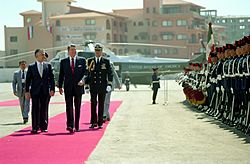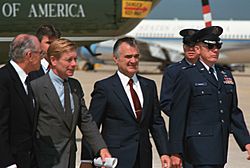Miguel de la Madrid facts for kids
Quick facts for kids
Miguel de la Madrid
|
|
|---|---|
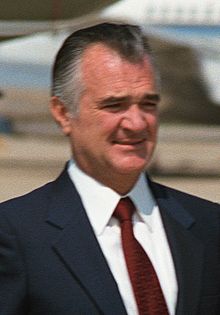
De la Madrid in 1986
|
|
| 59th President of Mexico | |
| In office 1 December 1982 – 30 November 1988 |
|
| Preceded by | José López Portillo |
| Succeeded by | Carlos Salinas de Gortari |
| Director of the Fund of Economic Culture | |
| In office 15 January 1990 – 13 December 2000 |
|
| Preceded by | Enrique González Pedrero |
| Succeeded by | Gonzalo Celorio |
| Secretary of Programming and the Budget of Mexico | |
| In office 16 May 1979 – 30 September 1981 |
|
| President | José López Portillo |
| Preceded by | Ricardo García Sainz |
| Succeeded by | Ramón Aguirre Velázquez |
| Deputy Secretary of Finance and Public Credit of Mexico | |
| In office 29 September 1975 – 16 May 1979 |
|
| President | Luis Echeverría Álvarez (1975–76) José López Portillo (1976–79) |
| Secretary | Mario Ramón Beteta (1975–76) Julio Rodolfo Moctezuma (1976–77) David Ibarra Muñoz (1976–79) |
| Preceded by | Mario Ramón Beteta |
| Succeeded by | Jesús Silva-Herzog Flores |
| Personal details | |
| Born |
Miguel de la Madrid Hurtado
12 December 1934 Colima, Mexico |
| Died | 1 April 2012 (aged 77) Mexico City, Mexico |
| Resting place | Iglesia de Santo Tomás |
| Political party | Institutional Revolutionary Party |
| Spouse | |
| Children | 5 including Enrique |
| Alma mater | National Autonomous University of Mexico (LLB) Harvard University (MPA) |
Miguel de la Madrid Hurtado (Spanish pronunciation: [miˈɣel de la maˈðɾið uɾˈtaðo]; 12 December 1934 – 1 April 2012) was a Mexican politician. He was a member of the Institutional Revolutionary Party (PRI). He served as the 59th president of Mexico from 1982 to 1988.
When he became president, Mexico was facing a very difficult economic situation. This was due to a big drop in oil prices and a large national debt. To fix this, De la Madrid introduced new economic ideas. These ideas aimed to make the economy more open to markets and reduce government spending. This marked the start of a new economic approach in Mexico. However, the economy still struggled with slow growth and rising prices during his time in office. Many people, especially those with lower and middle incomes, faced tough times. Their wages went down, and more people became unemployed.
His government also launched a "Moral Renovation" campaign. This campaign aimed to fight corruption in the government. Some officials from the previous government were even arrested. However, his administration also faced criticism. People were unhappy with how his government handled the big 1985 Mexico City earthquake. There were also questions about the results of the 1988 Mexican general election, where the PRI candidate, Carlos Salinas de Gortari, was declared the winner. Some people believed there was cheating in the election.
Contents
Early Life and Education
Miguel de la Madrid was born in Colima, Mexico. His father, Miguel de la Madrid Castro, was a lawyer who passed away when Miguel was only two years old. His grandfather, Enrique Octavio de la Madrid, was once the governor of Colima.
He studied law at the National Autonomous University of Mexico (UNAM). Later, he earned a master's degree in Public Administration from Harvard University in the United States.
In 1953, he met Paloma Cordero. They started dating in 1955 and got married in 1959. They had five children together: Margarita, Miguel, Enrique Octavio, Federico Luis, and Gerardo Antonio.
Early Career in Government
Miguel de la Madrid worked at the Bank of Mexico. He also taught law at UNAM. In 1965, he started working at the Secretariat of Finance.
From 1970 to 1972, he worked for Petróleos Mexicanos. This is Mexico's state-owned oil company. After that, he held several other jobs in the government. In 1979, he became the Secretary of Budget and Planning under President José López Portillo.
1982 Presidential Election
Before running for president, Miguel de la Madrid had never been elected to a political office. He was chosen by the Institutional Revolutionary Party (PRI) to be their candidate. The PRI had been in power for a very long time.
In the 1982 election, De la Madrid did not face a very strong opponent. His campaign focused on traditional values like fair representation and strengthening the government branches. Many people voted in this election, and De la Madrid won by a large margin.
Presidency (1982–1988)
President De la Madrid took office during a very difficult time for Mexico. The country faced a major financial crisis. The economy actually shrank for his entire term. One of his biggest challenges was the devastating 1985 Mexico City earthquake. The end of his term also saw controversy with the 1988 elections.
However, there were some positive moments. Mexico joined the General Agreement on Tariffs and Trade (GATT) in 1985. This agreement helps countries trade more easily. Mexico also participated in the Contadora Group. This group worked to find peaceful solutions to conflicts in Central America.
Economic Changes
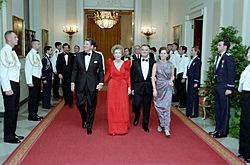
Unlike earlier Mexican leaders, President De la Madrid believed in a more market-focused economy. Prices rose very quickly, sometimes by 100% a year. In 1987, prices went up by an amazing 159%. Many people struggled to find full-time jobs, and their incomes decreased.
These problems were a reminder of how the economy had been managed before. There had been too much borrowing from other countries. When De la Madrid became president, he immediately started an "Immediate Economic Reorganization Program." He also created a "National Development Plan." These plans aimed to cut government spending, change tax rules, and protect jobs.
During his presidency, De la Madrid introduced new economic policies. These policies encouraged foreign companies to invest in Mexico. They also led to many state-owned businesses being sold to private companies. Taxes on imported goods were also lowered. This process continued with later presidents. In 1986, Mexico joined the General Agreement on Tariffs and Trade (GATT). The number of state-owned businesses dropped from about 1,155 in 1982 to 412 in 1988. De la Madrid tried to improve relations between the government and private businesses.
Local Elections and Changes
President De la Madrid first said that Mexico needed more democracy. The political system became more open to other parties. However, as other parties started to win more votes, his government seemed to resist their progress. The PRI still held most of the power in Mexico.
In 1983, during local elections in the northern state of Chihuahua, the National Action Party (PAN) won in the nine largest cities. These cities had 70% of the state's population. The PRI leaders in Chihuahua said that this loss was a "tragic disaster." They said it should not happen again.
The 1986 governor elections in Chihuahua were accused of being unfair. The PRI candidate, Fernando Baeza, was officially declared the winner. But the PAN candidate, Francisco Barrio Terrazas, did not accept the results. The PAN organized protests against the alleged fraud. Many other local elections during these years also faced accusations of fraud. Sometimes, these led to violent clashes. In some small towns, people even took over or burned town halls because of alleged election fraud.
Electoral Reforms
Because of these problems, changes were made to the election rules in 1986:
- The number of members in the Chamber of Deputies elected by proportional representation (plurinominales) increased from 100 to 200. This allowed smaller parties to have more say.
- The Senate now has two senators from each state and two from the Federal District. Half of its members are elected every three years.
- The Legislative Assembly of the Federal District of Mexico was created.
1984 Molotov Cocktail Attack
On May 1, 1984, an activist named José Antonio Palacios Marquina and others threw Molotov cocktails at the Presidential Palace. President De la Madrid was unharmed. However, many officials and guests were injured during the May Day parade.
San Juanico Explosions
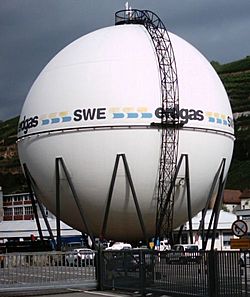
On November 19, 1984, a series of huge explosions happened at a gas storage facility in San Juan Ixhuatepec, near Mexico City. A gas leak caused a large cloud of gas to form. This cloud then reached a flame, causing explosions.
The explosions destroyed the town of San Juan Ixhuatepec. Between 500 and 600 people died, and about 7,000 people were severely injured. President De la Madrid visited the area the next day. He ordered help for the survivors and for rebuilding homes. An investigation found the state-owned oil company Pemex responsible for the accident. This tragedy made the public even more upset with the government.
1985 Mexico City Earthquake
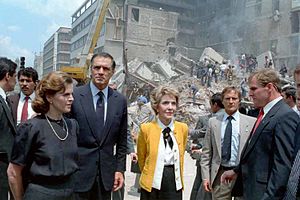
On September 19, 1985, a powerful 8.0 magnitude earthquake hit Mexico City. At least 5,000 people died. President De la Madrid's handling of the disaster was criticized. He initially refused help from other countries. This made his popularity go down. The earthquake also made Mexico's economic recovery even harder.
The government declared three days of mourning. At first, De la Madrid did not send the military to help with rescue efforts. Later, soldiers were sent to patrol streets to prevent looting after a curfew was put in place.
The earthquake caused many problems for the ruling PRI party. The government was seen as slow and not very good at handling the crisis. Many collapsed buildings were new, which made people think there was corruption in their construction. The government realized it could not handle the crisis alone. It decided to allow "opposition groups" to help.
1986 FIFA World Cup
During his time as president, Mexico hosted the 1986 FIFA World Cup. Some people protested against the tournament. Mexico was going through an economic crisis and was still recovering from the 1985 earthquake. Many felt the World Cup was too expensive and unnecessary. During the opening ceremony at the Estadio Azteca, President De la Madrid was booed by the crowd. This was likely a protest against his government's slow response to the earthquake.
Split in the PRI Party
In October 1986, a group of politicians from the Institutional Revolutionary Party (PRI) formed the Democratic Current. They were led by Cuauhtémoc Cárdenas, Porfirio Muñoz Ledo, and Ifigenia Martínez. This group wanted clear rules for choosing the party's presidential candidate. When their demands were not met, Cárdenas, Muñoz Ledo, and Martínez left the PRI. They then created the National Democratic Front, a group of left-wing parties.
Foreign Relations
In 1983, the Contadora Group was formed. This group included Colombia, Panama, Venezuela, and Mexico. Its goal was to promote peace in Latin America. They worked to resolve armed conflicts in El Salvador, Nicaragua, and Guatemala.
1988 Presidential Election
The 1988 election was different from past elections. For the first time in many years, two strong opposition candidates were popular enough to challenge the PRI candidate.
On Election Day, the computer system used to count votes suddenly stopped working. This happened when the opposition candidate, Cárdenas, was ahead. This event is remembered by the phrase se cayó el sistema ("the system crashed"). When the system was back online, Carlos Salinas de Gortari was declared the winner. The phrase "se cayó el sistema" became a way to talk about election fraud. All the opposition candidates said the results were unfair. They claimed the government had cheated. However, Salinas was confirmed as the winner by the Chamber of Deputies, which the PRI controlled.
After the Presidency
Leading the Fondo de Cultura Económica
After his presidency, Miguel de la Madrid became the director of the Fondo de Cultura Económica (FCE) in 1990. The FCE is a well-known publishing house. He brought in new ways to produce and manage books. He used advanced techniques in publishing and printing. He also made sure the company published a wide variety of books and ideas.
In 1992, he opened new facilities for the FCE. These included a cultural center and a library. The FCE also expanded its presence in other countries. In 1990, a branch opened in San Diego, California. In 1991, a bookstore opened in São Paulo, Brazil. By 1998, the FCE had a strong presence in Latin America with nine branches.
Under his leadership, the FCE started 21 new book collections. These included books for children, science books, and history books. The FCE also launched five new magazines.
During his time, the FCE received several awards. These included awards for children's books and for promoting reading in Spanish. In 1998, the government of France gave him the Academic Palms award. In 1999, he received the Picasso Gold medal from UNESCO. These awards recognized his contributions to culture and reading.
Death
Miguel de la Madrid passed away on April 1, 2012. He was 77 years old. He had been in the hospital for a long time due to a lung condition. This led to kidney problems and heart failure.
Public Image and Legacy
President De la Madrid was known for being more quiet and reserved than previous presidents. This was a change from the more public and popular style of leaders before him. Some people thought his public image was "gray." This feeling grew after his government's slow response to the 1985 Earthquake. He also initially refused international help after the disaster.
His biggest impact was likely his economic changes. He started moving Mexico away from government control of the economy. He began selling many state-owned companies to private businesses. This process continued even more under the next president, Carlos Salinas de Gortari. De la Madrid was also the first president who was a "Technocrat." This means he was a leader with a strong background in technical or economic fields.
However, these changes and his decision not to allow a primary election for the 1988 presidential candidate led to a split in the PRI party. In 1987, Cuauhtémoc Cárdenas and Porfirio Muñoz Ledo left the PRI. They later founded the Party of the Democratic Revolution (PRD) in 1989. Many former PRI members joined them.
His "Moral Renovation" campaign aimed to fight corruption in government. It also focused on paying Mexico's foreign debt. He created a new government office to watch for corruption. However, his administration still had some corruption issues of its own.
Finally, how his government handled the 1986 elections in Chihuahua and the 1988 Presidential elections remains very controversial.
In a survey done in 2012, 36% of people thought De la Madrid's presidency was "very good" or "good." 26% thought it was "average," and 30% thought it was "very bad" or "bad."
|
See also
 In Spanish: Miguel de la Madrid para niños
In Spanish: Miguel de la Madrid para niños
 | Delilah Pierce |
 | Gordon Parks |
 | Augusta Savage |
 | Charles Ethan Porter |


